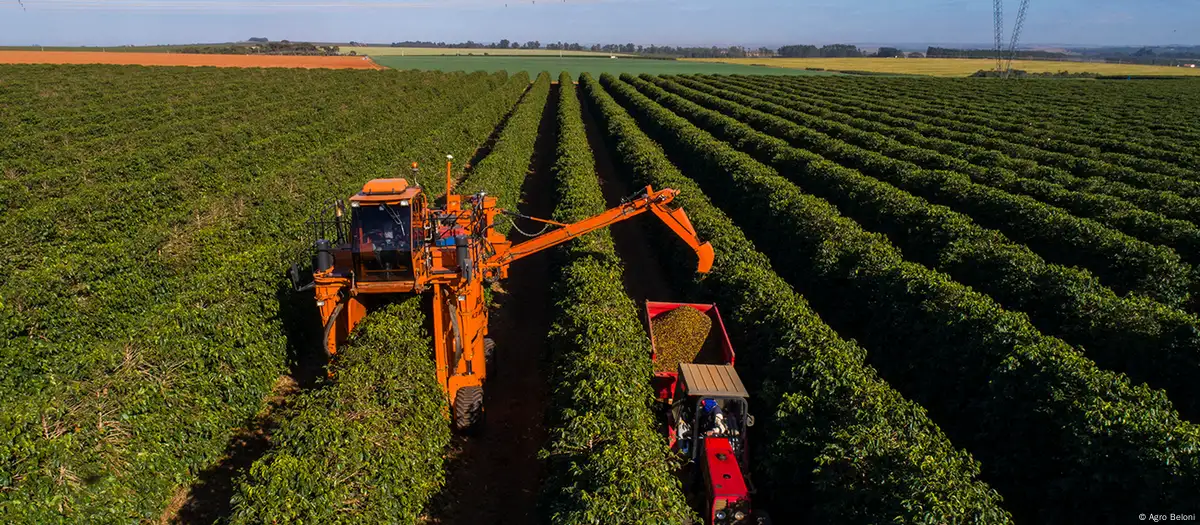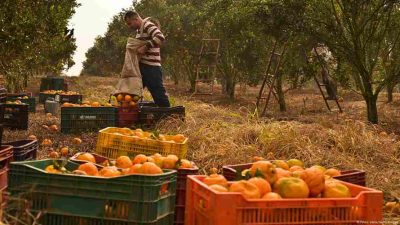
US receives 7% of everything that is exported by Brazil. Agribusiness sectors condemn political motivation of surcharge and predict damage to sales of coffee, orange juice and beef.
In the refrigerators that prepare beef for shipping to the United States, production slowed down. Since the unexpected announcement of the taxation of 50% on Brazilian products imposed by the US President Donald Trump, awaited to take effect on August 1, the uncertainty was slaughtered on Brazilian agribusiness.
“The sector is seeking to understand how we need to act to reshape and redirect these loads and production. Brazilian industries have temporarily decided to pause production for the United States,” responded to DW Roberto Perosa, president of the Brazilian Association of Beef Industry (Abiec) in conversation with the international press on Friday (11/07).
In a mission in the United States, Perosa has met with importers, who are also surprised. In that country, the expectation is now rising prices, as Brazilian meat has complemented the demand of the US market, shaken by low in livestock due to drought in productive areas.
In Brazil, the sector tries to reorganize against the unilateral measure. ABIEC states that the business relationship was beneficial to the United States, as Brazilian meat was bought at a much lower cost than that sold to US consumers, which helped cheaper the price in that country.
“Now we present us with a political decision, even fostered by a political group in Brazil. It is scary, it is very unpredictable. The limits of political action can not cause damage to the population of our country,” says Perosa without mentioning the Bolsonaro family, fearing impacts on jobs in Brazil.
“Bow the dust”
The Brazilian government tries to contain the crisis with diplomacy. The country avoids adopting reciprocity and says it will wait for the surcharge to take effect while trying to negotiate smaller deadlines and percentages. The United States is a destination of 7% of all exported Brazilian products.
“This is a difficult time of our international relationship. Let’s wait for ‘dusting’. If there is no consensus, Brazil is sovereign, it will not accept unilateral impositions,” says Luís Rua, Secretary of Trade and International Relations of the Ministry of Agriculture and Livestock (Mapa) to journalists.
Sale of beef to USA, which was expected to double in 2025, will be unfeasible | Eraldo Peres/AP Photo/Picture Alliance
According to the federal government, the strategy of diversifying markets accelerated after Trump’s election. Since Luiz Inacio Lula da Silva took over the third term, the map says it has opened 393 new opportunities for Brazilian exporters.
The Brazilian Association of Agribusiness (ABAG) provides negative impacts throughout the export production chain of Agro. The entity says betting on a democratic solution and encourages dialogue between governments before tariffs enter into force.
In addition to beef, the association foresees bumps in the Brazilian agro -industry of paper and pulp, orange juice, sugar and coffee. “This is a political issue that needs to be debated between countries. After all, such action will not only disadvantage the Brazilian exporter, but also the American consumer himself,” says the association’s note.
Bitter coffee
In a scenario already affected by the climate crisis, which caused low production worldwide, the global coffee market should also feel the consequences. This is because Brazil is the largest producer and global exporter of the grain, and the United States are the largest consumers.
“It’s a moment of great tension, a lot of concern. But one does not live without the other. Brazil is the largest coffee supplier for the United States, who have 76% of its population that drinks the drink, which makes them the largest consumers on the planet,” he tells DW Marcos Matos, director of the Brazilian Coffee Exporters (Cecafé).
Of the 24 million coffee bags consumed by Americans last year, 8.1 million came from Brazil, the Cecafé data points out. In the account by countries, the United States, Germany and Italy are the largest buyers of this Brazilian product.
The grain that comes out of Brazil’s crops is critical to moving the American industry around the drink. A recent economic study by the National Coffee Association showed that for every dollar of imported green coffee, $ 43 is generated in the economy.
Unlike meat, coffee is not planted in the United States. Sources heard by DW say that US entities and companies work behind the scenes to reverse the taxation. They prefer to act away from the spotlight, fear of confrontations and misinterpretations of political sectors.
“We trust the Brazilian government. The whole ministry is committed. We trust a pragmatic, strategic, with economic bias,” points out Matos.
Going out orange juice
The surcharge endangers the Brazilian orange juice sector, says Citrusbr, an association that represents exporters. In the 2024/25 crop, almost half of what was sold outside the country went to the United States (41.7%).
By note, the association explains that, with the new tariff, about 72% of the total value of the product would be collected in taxes, making exports to that market unfeasible. “This is an unsustainable condition for the sector, which has no room to absorb this type of impact,” says the note.
 The surcharge endangers the Brazilian orange juice sector, says Citrusbr | Pedro Vilela/Getty Images
The surcharge endangers the Brazilian orange juice sector, says Citrusbr | Pedro Vilela/Getty Images
The sector provides for serious consequences such as harvesting, disorganization in factories and trade stoppage. Although the European Union is the largest market in Brazilian juice, it should not be able to absorb the surplus.
“Citrusbr, in communication with the Brazilian government, reiterated the need for Brazil to fully exercise its diplomatic tradition, mobilizing all the resources of the Brazilian State to deal with the protection of the interests of its citizens, employment and income,” says the statement issued to the press.
Paralysis in shipments
In the ports, fishing charges pile up after the cancellation of several requests from American companies, which buy 80% of Brazilian production. It is not known what will happen to products that are on the route and eventually arrive at the destination after August 1, when extra taxation is valid.
The sale of beef to the United States, which was expected to double by 2025, will be unfeasible. From January to June this year, there were 190,000 tons exported, almost the level of the 220 thousand tons registered in the 12 months of 2024.
The cut appreciated by the Americans, who is the front of the ox, is not the taste of Brazilians. When it arrives in the United States, it is transformed into hamburger, which represents 68% of beef consumption in that country, details ABIEC.
“The sector is seeking to understand the situation to re -scalon and reorganize the industry. Rearrangement should be done with countries to which we have exported,” points out, citing focus on Asian countries and Middle East.
The Brazilian government says it will support redirection and that it is in direct contact with agribusiness entities to create specific actions to reduce impact.
Originally published by DW on 12/07/2025
By Nádia Pontes
Source: https://www.ocafezinho.com/2025/07/12/agro-brasileiro-aciona-diplomacia-contra-tarifaco-de-trump/

